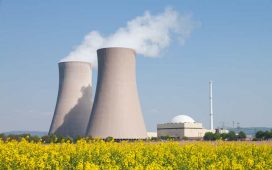Unlock the Editor’s Digest for free
Roula Khalaf, Editor of the FT, selects her favourite stories in this weekly newsletter.
The French government is pushing British ministers to provide loan guarantees for Hinkley Point C to try to ease EDF’s financing costs on Britain’s new flagship nuclear power station as its price tag has soared.
EDF, the French state-owned utility, said last week that the cost of the new nuclear power station it is building in Somerset could hit as much as £46bn, up from £18bn in 2015 prices, as it pushed the completion date of the first of two reactors back by at least two years to 2029 at the earliest.
Under the contract drawn up a decade ago, any construction cost overruns at Hinkley fall on EDF rather than the British taxpayer.
But French officials are pushing the UK to provide EDF with state guarantees on new Hinkley-related loans, according to three people familiar with the matter. This could allow EDF to issue project-level debt and relieve pressure on the company’s finances.
Until now, the project has been equity-funded by EDF and CGN, the Chinese junior partner in the scheme. CGN has ceased contributing to the overruns, having already fulfilled its contractual obligations, after the UK government took steps to push the Chinese company out of the nuclear sector following a deterioration in relations with Beijing.
The UK government insists it would not shoulder any costs. “Hinkley Point C is not a government project and so any additional costs or schedule overruns are the responsibility of EDF and its partners and in no way will fall on taxpayers,” it said.
The proposal by French officials is similar to an initial offer by the UK government when the Hinkley contracts were first negotiated. In 2014 ministers offered EDF a loan guarantee of £10bn on the project.
But when the final investment decision was taken in 2016, British officials withdrew the offer due to concerns about mounting cost overruns at EDF’s project to build a new nuclear power station at Flamanville in France that uses the same reactor technology as Hinkley.
Instead, the British government agreed to a generous subsidy arrangement that guaranteed a minimum price for Hinkley’s future power supplies to help finance the build. An offer of a short-term guarantee on £2bn of loans was rejected by EDF.
People close to the talks said French officials had floated other options to ease the financial burden on EDF, including the British government bringing another partner into the project and reopening the subsidy arrangement on future power supplies.
“We’ve always said that at a certain moment, we could search for more partners if needed,” a person close to EDF said.
One British official acknowledged pressure from Paris to find a compromise was building. “In the end, governments always own failure in [their own] big national infrastructure,” said one person close to UK ministers. “The get out of jail card here is that we transferred the risk to another state but the question is whether, in extremis, we can enforce that transfer. Ultimately it becomes a potentially very messy government-to-government issue.”
Although EDF was fully nationalised by the French state last year its borrowings are not treated by bond markets as equivalent to sovereign debt. S&P rates EDF as BBB compared with AA for French government bonds.
Another French proposal could involve changes to the terms of the deal to build EDF’s other big UK nuclear project, a planned new power station at Sizewell in Suffolk.
This is being funded differently to Hinkley with the British government committing £2.5bn after taking a 50 per cent stake alongside EDF in the company set up to deliver the plant. They are looking to raise a further £20bn from outside investors. In theory EDF could put more money into Sizewell in return for greater government help with Hinkley.
Another French idea is to persuade the UK to bring forward some of its future financial support for Hinkley. But this is contingent on the sale of power produce by the plant once it is operational so it is unclear how this would work in practice.
Additional reporting by Rachel Millard











